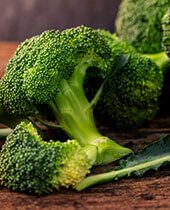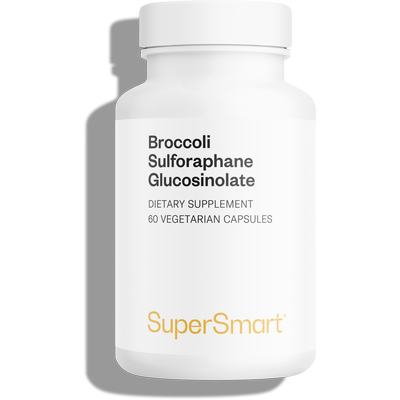03-05-2017
Obesity: the promising properties of broccoli
 A little while ago, in one of our articles, we explored the many health virtues of cabbages. Now broccoli, a member of the cabbage family and packed with nutrients and antioxidants, has again been shown to have therapeutic potential. Japanese scientists have demonstrated that a compound in broccoli may have positive effects against obesity. Their discovery opens up promising new perspectives given the alarming scale of the global obesity epidemic. In 2014, the World Health Organization (WHO) estimated that 1.9 billion adults across the globe were overweight, with 600 million potentially classed as obese1. It seems incidence may have doubled since 1980. Suffice to say that these new findings on broccoli are being closely studied by the scientific and medical communities. Here we report on this research which was published in the journal Diabetes2.
A little while ago, in one of our articles, we explored the many health virtues of cabbages. Now broccoli, a member of the cabbage family and packed with nutrients and antioxidants, has again been shown to have therapeutic potential. Japanese scientists have demonstrated that a compound in broccoli may have positive effects against obesity. Their discovery opens up promising new perspectives given the alarming scale of the global obesity epidemic. In 2014, the World Health Organization (WHO) estimated that 1.9 billion adults across the globe were overweight, with 600 million potentially classed as obese1. It seems incidence may have doubled since 1980. Suffice to say that these new findings on broccoli are being closely studied by the scientific and medical communities. Here we report on this research which was published in the journal Diabetes2.
A new approach to tackling obesity
The Japanese scientists investigated a specific compound in broccoli called glucoraphanin, hypothesising that it might affect a cascade of reactions in the body called the Nrf2 pathway. Related to the activation of nuclear factor (erythroid-derived 2)-like 2, this pathway potentially mitigates obesity, as has been demonstrated in several mouse studies in which the Nrf2 pathway both alleviated obesity and reduced insulin resistance. A number of research teams are thus working to find ways of inducing this cascade of reactions in order to address the problem of obesity. With this new therapeutic approach, the researchers hope to be able to reduce the chronic inflammation responsible for the development of obesity and improve the energy balance of obese individuals.
Promising results from glucoraphanin supplementation
To test the effects of this broccoli compound, the researchers fed mice a high-fat diet and at the same time supplemented them with glucoraphanin. Results from the glucoraphanin supplementation were encouraging: it attenuated both obesity and hepatic steatosis (fatty liver), a disorder affecting diabetic and obese individuals as well as alcoholics. The researchers also found lower levels of lipopolysaccharides and decreased abundance of certain bacteria in the gut microbiota of the supplemented mice. In addition, the glucoraphanin appeared to have increased energy expenditure and expression of certain proteins, while at the same time reducing hepatic lipogenic gene expression, lipid peroxidation and inflammatory signalling pathways. Through these various actions, glucoraphanin may thus regulate and attenuate obesity, insulin resistance and non-alcoholic steatosis. These preliminary results were compared with the effects of glucoraphanin supplementation in mice in which the Nrf2 pathway had been inactivated. This confirmed that glucoraphanin does indeed act on this cascade of reactions.
While further studies are necessary, the glucoraphanin compound present in broccoli appears to represent an important means of inducing the Nrf2 pathway and thus mitigating obesity. These new findings also confirm broccoli’s therapeutic potential. This has led to the development of broccoli-based dietary supplements, formulated from broccoli extracts standardised in active principles for optimum benefits. One such supplement is the formulation Broccoli Sulforaphane Glucosinolate.
> Sources :
1. Organisation Mondiale de la Santé (OMS), Obésité et surpoids, Aide-mémoire N°311, Juin 2016.
2. Naoto Nagata, Liang Xu, Susumu Kohno, Yusuke Ushida, Yudai Aoki, Ryohei Umeda, Nobuo Fuke, Fen Zhuge, Yinhua Ni, Mayumi Nagashimada, Chiaki Takahashi, Hiroyuki Suganuma, Shuichi Kaneko, Tsuguhito Ota, Glucoraphanin Ameliorates Obesity and Insulin Resistance Through Adipose Tissue Browning and Reduction of Metabolic Endotoxemia in Mice, Diabetes 2017 Feb; db160662.
Order the nutrient mentioned in this article

Broccoli Sulforaphane Glucosinolate is formulated from a standardised extract of broccoli (Brassica oleracea).
www.supersmart.comFurther reading
05-08-2016
Here’s a simple way to burn calories without having to undertake strenuous exercise - or even move an inch.Scientists have discovered that the body uses...
Read more06-07-2019
If you haven’t yet come across the medicinal plant gymnema (Gymnema sylvestris) , you may be surprised by just how many health benefits it offers....
Read more10-05-2016
If you’ve consistently failed in your attempts to lose weight, it could be you’re missing a key ingredient. That ingredient is a healthy gut flora....
Read more© 1997-2025 Fondation pour le Libre Choix
All rights reserved
All rights reserved
Free
Thank you for visiting our site. Before you go
REGISTER WITHClub SuperSmart
And take advantage
of exclusive benefits:
of exclusive benefits:
- Free: our weekly science-based newsletter "Nutranews"
- Special offers for club members only

















